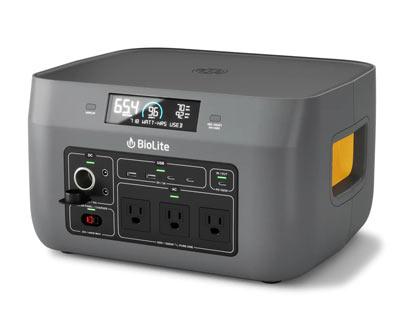Welcome to our Best Portable Power Stations buyer’s guide which features the top brands that are producing the highest quality portable power stations for camping, road trips, and home backup solutions.
There are many reasons why it’s worth owning a portable power station or battery generator but the following scenarios are probably the most popular:
- You enjoy camping and would like to have peace of mind knowing that you will have enough portable power on your trip to charge all of your devices (and your family’s), power your camp lighting, and run various appliances like a mini fridge or portable AC unit for example.
- You’re planning a road trip and need to be able to keep your whole family’s devices charged while on the road.
- You plan to live off the grid, and want to take the first step to becoming more self-sufficient in your home or on the road.
- You own, or plan to rent a camper van / RV and need an additional uninterrupted power supply during your road trips. If you can believe it, we actually used a portable power station to build our camper van conversion as we didn’t have access to mains power at the time.
- You need a reliable at-home backup battery generator or portable power station due to frequent power outage occurrences in your local area. Emergency backup power is often overlooked, when it should be a priority for many home owners, depending on where they live.
Yes, there are certainly more edge-case scenarios where you may wish to have a portable power station but these are the most common reasons.
When buying a portable power station there are some important features and specifications that you should be looking at in order to know if it’s going to be sufficient for your needs and worth your hard-earned money – these features include:
- Maximum battery capacity – Watt hours.
- Charge Time – of the power station itself.
- Outputs – ports and Wattage.
- Inputs – ways in which to charge your power station – solar panel, AC wall outlet, Car port, etc.
- Size & weight – this determines the true portability of your power station.
- An LCD display with metrics like power consumption, power input, battery level, etc.
- Cost
Overview of the Best Portable Power Station Brands
Before we dive into the details and more in-depth reviews of each brand on this list, here’s a quick summary of the best brands that offer a range of portable power stations of different sizes for you to choose from.
1. EcoFlow
EcoFlow has developed a complete ecosystem of products over recent years to meet different portable power needs, but the two product ranges you need to know about are their DELTA and RIVER power stations.
The Ecoflow DELTA – and specifically, the Delta Pro – is capable of delivering full-home backup power, with impressive power and capacity
The Ecoflow RIVER portable power stations are smaller portable power solutions that are great for shorter term off-grid use between charges, including working away from home or a direct outlet power supply.
2. Biolite Energy
Biolite sells a range of well-designed, innovative outdoors-oriented products including portable power stations, solar-powered lighting and a wood-fired campstove that can take care of many of your essential requirements while camping, hiking or backpacking for days at a time while you’re off the grid.
Their BaseCharge portable power stations are sleek, user-friendly and great value, especially when bought bundled with solar panels, lighting and other devices they offer.
Read more below – or head over to or in-depth Biolite BaseCharge 1500 portable power station review.
3. Jackery
Jackery produces some of the best portable power stations (the Jackery Explorer range) and is particularly popular with van lifers or people who spend a lot of time on the road in their RV, tent, or car camping.
For a wide range of more rugged portable power stations in sizes from very small, ultra-portable power stations to the hefty Explorer 2000, there’s going to be a Jackery Explorer out there that’s suitable for your needs.
4. Goal Zero
Like Ecoflow, Goal Zero also has a broad ecosystem of products including power stations, solar panels, home & vehicle integration kits, expansion tanks, and lighting.
Their portable power stations are available in a range of sizes and it’s worth noting that due to its reliable reputation, the Goal Zero ecosystem is getting popular among van builders and conversion companies looking for a streamlined energy solutions setup for off-grid camper vans and other camping setups.
5. Anker
Portable power specialist Anker not only has a range of smaller portable power banks but also portable power stations, named PowerHouse for a reason.
Anker products come with a 5-year warranty (when bought directly from Anker) giving you peace of mind for your investment in a premium portable power station from this company.
After reading our roundup of the best portable power stations (at the end of this article), you can find some very useful frequently asked questions like “what is a watt-hour?”, “what makes USB-C so great?”, “what does a solar charge controller do?”, and more!
It’s worth learning about some of the associated terminologies as it will help you choose the right portable power station for your specific requirements.
The Best Portable Power Station Brands
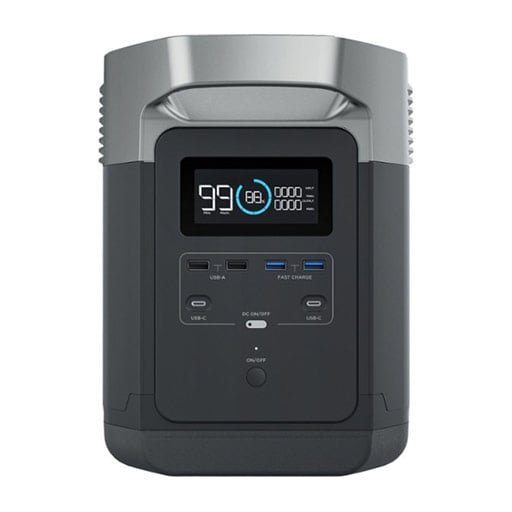
1. EcoFlow Delta, River & Wave Power Stations
Read my in-depth Ecoflow review which shares my experiences using the Delta Pro, River Pro, Wave AC Unit, and solar panels.
Right now, for me, it’s the EcoFlow brand that stands out from the rest; their River and Delta series are the best portable power stations I’ve used so far.
They have been taking the portable power segment by storm with their wide variety of smart portable power solutions.
EcoFlow has been growing a complete ecosystem of products over recent years, designed to meet the needs of how people may plan on using their power systems (because there are so many scenarios nowadays, as outlined above).
These product lines include home backup smart battery generators, hybrid solar/gas generators, portable power stations, solar panels, a portable AC unit, and a smart home panel that allows your home to auto-switch to your EcoFlow stored power when the grid goes offline.
Perhaps the most radical and game-changing product from Ecoflow, however, is the recently released ‘complete power kits‘. These are modular in design and can take you completely off-grid whether that be in a DIY converted camper van, your home, or a cabin in the wilderness.
We love how most EcoFlow products can actually be used together, as a modular system of sorts. You can also see all your power sources within the EcoFlow App, an app that works more seamlessly (with more useful features) than some of the competitors’ apps.
The EcoFlow app is a great way to quickly check how much power your devices are using, but also how much power your solar panels or mains hookup is pumping into your batteries.
EcoFlow DELTA & RIVER Portable Power Stations
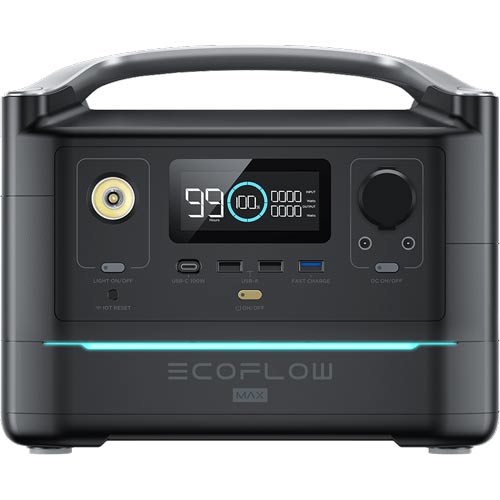
Speaking of charging your EcoFlow batteries, I have never experienced such fast charging as I have with EcoFlow products.
I own and have been testing both the RIVER Pro and DELTA Pro portable power stations which are two very different products but both have exceptionally fast charge capabilities from a wall outlet.
The River series are EcoFlow’s most lightweight portable power stations.
The RIVER Pro is my favorite portable power station (I’ve tried a few in my time), and the DELTA Pro (less portable but arguably more versatile) has just been amazingly useful at home when the grid goes offline.
I live in California so blackouts or power outages are becoming more frequent due to suppliers like PG&E being required to turn off the electricity supply to mitigate the risk of accidental fires at times of high-fire risk.
I really like how I can plug our fridge into our Delta Pro right away to ensure our food stays cool, and it can be used for pretty much anything in our house including our professional espresso machine.
For anyone wondering, the RIVER series is more for those who are looking for a lightweight portable power solution that can charge devices like laptops, smartphones, and speakers.
However, the RIVER Series doesn’t have a high enough power output to be able to power large appliances that require a lot more power.
The DELTA series on the other hand, is a power station for those looking for a portable power station (although much heavier) that can power larger hardware like appliances (hairdryer, coffee machine, mini fridge, etc).
The Delta Pro offers much more stored power and has a higher power output, which is important for those types of devices which require more power but it can also simultaneously power devices that are smaller with all the USB ports available on the front.
If you ever have a power outage in your home, the Delta Pro is going to be your best friend.
NEED EXTRA HELP CHOOSING? If you’re reading this article and by the end of it you’re still not sure which device is best for your needs, let me know in the comments and I’ll do my best to help you find the best device based on your specific requirements. I know this topic can seem daunting at times, which is why I’m trying to help simplify it for our readers.
The DELTA Pro can charge at astonishingly fast rates of 1800W Max, 120V AC, 15A; 3000W Max, 240V AC, 12.5A, and 1600W via solar panels.
You can also charge the DELTA Pro power station at EV Charge stations to get up to 3400W of input should you need to top up while on the road.
I just love that feature but beware, this power station is a total beast and isn’t easy to carry around with you (it does have wheels to wheel it though) – it’s mainly for home backup, backyard power, or for those who spend a lot of time in a camper van, RV or at a campsite.
Charging at this speed will get your DELTA Pro to FULL in a ridiculous 1.7 hours. Plugging it in to charge at home will get it full in 1.8hrs, which is also super impressive.
There are other portable power stations that can charge quickly but as far as I’m aware, not as fast as EcoFlow’s technology.
If you need even more charge speed it’s also possible to combine AC, solar charging, and EcoFlow’s Smart Generator at the same time to get record-breaking 6500W charging speeds.
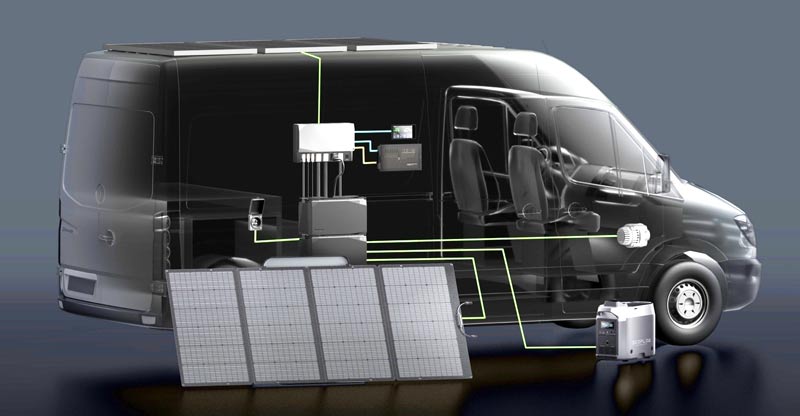
Ecoflow Power Kits are, in my opinion, the future of how van lifers will be gearing out their electrical systems for their DIY van conversions.
We have a lot of experience in this area, having built our own DIY camper van, and let me tell you this – the electrical system was probably one of the hardest things to do in the entire can build. So, as you can imagine, a plug-and-play system like Ecoflow Power Kits is such a godsend!
2. Biolite Energy BaseCharge
Renewable energy and portable power specialists Biolite have a range of power solutions available, which are compatible with not only wall outlet charging but also off-grid solar-powered charging setups.
Their BaseCharge 600 and 1500 portable power stations are designed for you to access home-standard power in off-grid environments, whether that’s at home during a power cut, camping or while you’re on the road traveling.
What makes the Biolite portable power stations stand out is how user-friendly they are, as well as the overall premium, well-designed feel of them when they’re in use. They look attractive and are super simple to use and monitor using the LCD screen on the front.
For an in-depth look at the BaseCharge 1500, the larger model, read my full Biolite Basecharge 1500 review.
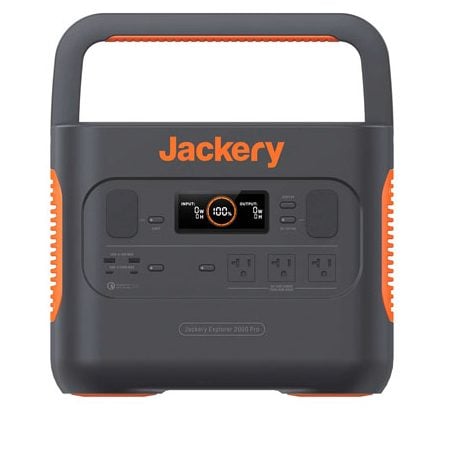
3. Jackery Explorer
Jackery was founded in California in 2012 and now has over 9 years of experience in the field making the brand a global energy leader, and one of the top producers of portable power station technology.
In redefining the use of clean energy for outdoor living, Jackery is a major player in the fight against climate change – and I love them for that.
If you’ve ever been on Instagram and enjoyed getting inspiration for camping or DIY camper van builds then you will probably recognize the striking orange colorway used on Jackery power stations, which I personally really like.
I mentioned earlier that we built our entire camper van conversion using a portable power station to charge our cordless power tools – well, that particular portable power station happened to be a Jackery Explorer 1000 – there are even more powerful ones available now as well as less powerful small portable power stations.
In hindsight, a larger device like the Explorer 2000 would have been even better than our Jackery 1000 for the job as we could have powered larger tools that require a much higher power output, like our table and miter saws – if only it was available back then.
Jackery portable power station options
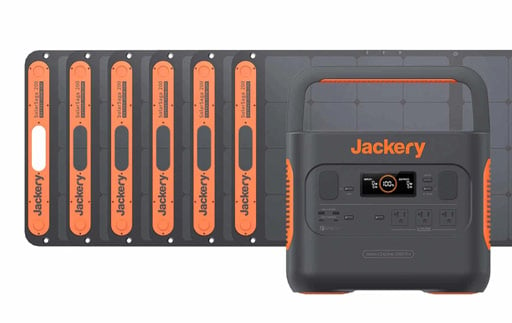
Jackery offers two types of products: portable power stations and solar panels.
If you are in need of a way to operate your devices off-grid, then you’ll likely want to buy a Solar Generator which is essentially a package deal that bundles a portable power station along with some solar panels.
This setup gives you everything you need to be able to keep your Jackery Explorer fully charged without the need to charge via mains power.
This is very useful for anyone who enjoys camping trips, RV’ing, or anyone who is looking to have less of a reliance on the grid electricity, which we all know is getting more and more expensive.
Jackery also makes a rather cute mini Explorer called the Explorer 160 which would make a great gift for anyone who enjoys spending time outdoors. The Explorer 160 is only $139.99, weighs as little as 3.97 lbs (1.8 kg), and can charge your smartphone roughly 15 times on one charge.
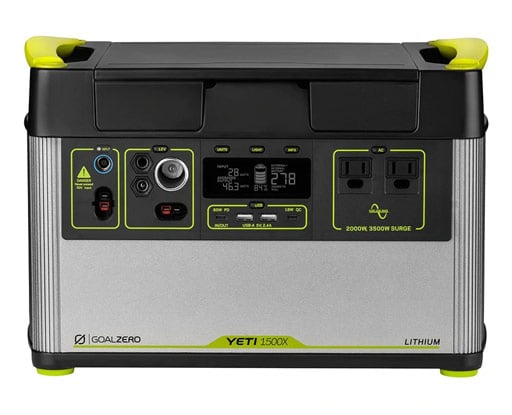
4. Goal Zero Yeti
Goal Zero is another brand that has been in the game for a long time (over 13 years as of creating this article), and like Ecoflow, also has a broad ecosystem of products including power stations, solar panels, home & vehicle integration kits, expansion tanks, and also lighting.
Goal Zero portable power station – Yeti Series
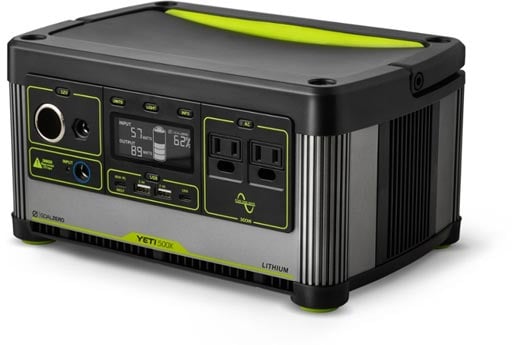
The Goal Zero portable power station line is called the Yeti, and is available in 9 different sizes, with varying battery capacity and power output.
The three most popular Yeti power station units are the Yeti Lithium 1500X, Yeti Lithium 500X, and the Yeti 150 which is their smallest and most portable unit.
A differentiator for Goal Zero portable power stations is that they are made with metal enclosures which gives them a strong, more durable outer shell.
The Yeti Lithium 1500X is Goal Zero’s most versatile unit (for the size, weight, and price) with a 2,000W AC inverter that can power off-grid events, work sites, base camp, and your home essentials during emergencies. This is why it’s their best seller.
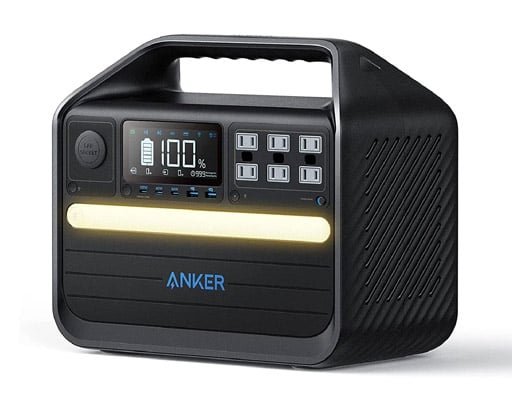
5. Anker PowerHouse
You would be hard-pressed to find someone who hasn’t heard of the Anker brand before because of the popularity of their power banks.
Not a lot of people know, however, that they also make larger portable power stations like the Anker 555 PowerHouse, for example.
This beast, according to Anker, offers a 6× longer lifespan when compared to similar power stations using standard Lithium-ion batteries due to Anker’s Premium LPF (LiFePO4) batteries.
Anker products also come with a 5-year warranty for a guaranteed, worry-free purchasing experience. Just make sure you buy direct with Anker to ensure this warranty holds true, as some merchants can be a bit awkward when it comes to returns.

The solar generator version of the Anker 555 PowerHouse (which is essentially a package that includes solar panels) features a 200W solar charging input with 45% higher solar panel charging efficiency, a unibody drop-proof structure, and 3 high-speed charging USB-C ports with a 100W max power output.
Anker also manufactures excellent portable power banks which are much smaller devices designed to be super portable and offer additional power to small devices like smartphones. They a good choice for a camping battery but even better for road trips and travel.
Our top pick for portable power banks is the Anker 747 power bank.
Here are some FAQs to help you better understand the terminology associated with Portable Power stations
What is a Lithium Ion battery?
A lithium-ion battery (also known as a ‘Li-ion’ battery) is essentially a premium rechargeable battery as you get a much longer battery life.
Compared to other commonly-used batteries, lithium-ion batteries have a high energy density and low self-discharge. This basically means that you can store more energy ‘juice’ or ‘charge’ in one of these batteries than in another type of battery (such as nickel-based batteries) of the same size – in layman’s terms you get much better battery life.
Plus, a li-ion battery does not discharge by itself when not in use, so you’re less likely to find that the battery is ‘dead’ when you haven’t used it for a while.
If you want to geek out on the technical features of lithium batteries, learn more on this Wikipedia page.
What is a Watt hour?
The measurement of Watt Hours is a way of measuring a device’s battery capacity over a period of time (hours).
Without going into a lot of detail, an easy way to understand Watt Hours when comparing the features of various portable power stations is by considering examples.
If a device is rated at 10 Watts then if you used it for 12 hours then it would have used 120 (10 x 12) Watt Hours of power.
There’s a useful in-depth explanation of Watt Hours, with examples, on Goal Zero’s website.
What is a BMS?
A BMS, or Battery Management System does what it says – it manages the battery and performs functions such as ensuring it doesn’t operate outside of its safe operating area.
What is AC Power?
AC power is the standard electricity that comes out of power outlets you typically see in your homes, which require those three-prong plugs.
What is USB-C?
USB-C is a popular cable size used for connecting and charging many devices including laptops, cameras, and smartphones.
The ends of these cables are shaped like an elongated oval, with round corners and are much smaller that the standard wall outlet plugs which means you can fit more USB ports on your portable power station.
When it comes to supporting devices requiring higher wattage and voltage, it’s more capable than the older USB versions such as USB-A (the more basic, rectangular-shaped USB connectors). It also has better data transfer rates and power throughput.
A USB-C port is going to charge your devices 30-50% faster than USB A ports.
What does a solar charge controller do?
The charge controller regulates the amperage and voltage that comes from your solar panel to the battery. This is an important part of the process of solar charging as it is designed to prevent the battery from ‘overcharging’ and the longevity of its battery life is compromised as a result.




